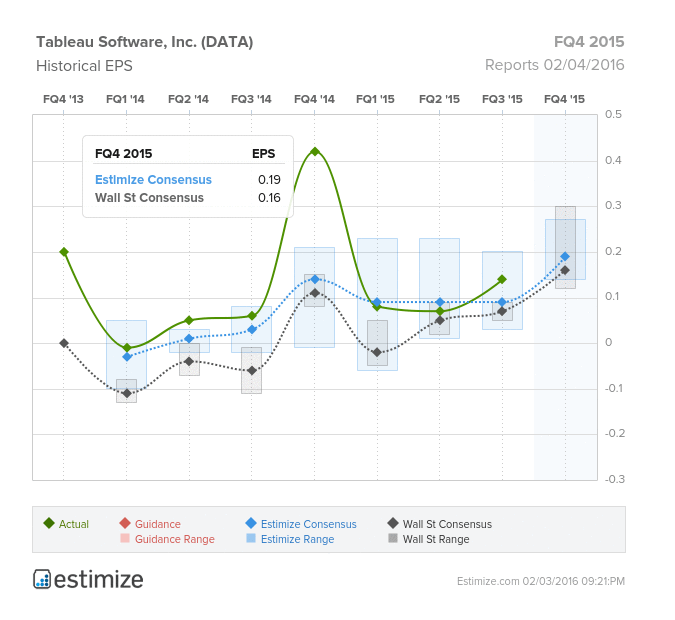Tableau Software Inc Data Issues Q4 Earnings Guidance

In recent developments concerning Tableau Software Inc., the anticipation surrounding its Q4 earnings guidance has reached a crescendo, owing in part to discussions about the efficacy and integrity of its data management and analytics capabilities. As organizations increasingly depend on data to drive decision-making, the ramifications of Tableau’s upcoming earnings report extend beyond the company's financial performance; they permeate the wider tableau of the tech and analytics landscape.
Data analytics, as a discipline, melds insight and information to foster strategic business initiatives. Tableau, with its innovative analytical tools, has emerged as a vanguard in this domain, contributing significantly to the ability of enterprises to visualize their data in meaningful ways. As we move closer to the end of the fiscal year, however, some analysts posit that Tableau may face unexpected hurdles affecting its earnings forecasts for the last quarter.
One cannot underestimate the importance of accurate data. Analysts observe a recurring theme within the tech sector: the proliferation of both structured and unstructured data demands not only robust analytic frameworks but also an unwavering commitment to data integrity. Tableau's historical strength lies in its user-friendly visualization tools, which empower organizations to draw insights from disparate data sources with relative ease. Despite these advantages, recent assessments suggest potential discrepancies in data handling practices that could prove detrimental to Tableau’s Q4 performance.
Concerns have emerged from several quarters that highlight a troubling trend: data quality issues could hinder enterprises' ability to rely on analytics for critical decision-making. Companies that utilize Tableau’s offerings are increasingly vocal about experiences of flawed reporting mechanisms that may undermine the credibility of their own internal analyses. These issues could result in a trust deficit among users, leading to a subsequent contraction in Tableau's market share, particularly in competitive environments where data fidelity is paramount.
Moreover, as data privacy becomes an increasingly pertinent topic, Tableau finds itself navigating a labyrinth of regulatory compliance mandates. The landscape is further complicated by ever-evolving consumer expectations regarding data use and protection. The company’s approach to these challenges will dramatically influence its market positioning and, consequently, its earnings outcome for Q4. Investors are understandably vigilant; any sign of slippage in compliance could trigger a cascade of negative sentiment towards the stock.
The fiscal implications of these data challenges stretch into the broader economic trends as well. Consumer spending, which represents a significant catalyst for revenue generation, remains unpredictable. Advances in AI and machine learning augment the scope of data analytics, but if Tableau cannot demonstrate not just growth in adoption but also the reliability of its analytics, it risks alienating its existing customer base. Investors will be scrutinizing Q4 earnings metrics not just for revenue, but for signs that Tableau can effectively wrestle with these multifaceted challenges while fortifying its reputation within the industry.
Amidst these uncertainties, Tableau’s executive team has taken steps to allay investor concerns. Strategic initiatives aimed at enhancing product offerings and advancing user engagement tactics have been spotlighted. Encouraging adoption of enhanced training programs and transparency in reporting functions may serve to replenish user confidence. However, translating intentions into tangible outcomes will be critical; lofty goals devoid of operational execution may fall flat, thus affecting the company’s financial projections.
Forward-looking statements from the company's leadership during recent earnings calls have underscored their commitment to continuous improvement and innovation. Yet, the efficacy of these strategies must ultimately translate into improved earnings performance. The capacity to balance innovation with stability in its product offerings is pivotal as Tableau enters a nascent stage of competition with new analytics solutions claiming to offer greater simplicity and reliability.
In considering the ramifications of Tableau’s August earnings guidance, it is prudent to view it through the lens of broader societal impacts. The reliance on data for informed decision-making has never been more critical, a reality sharpened by the recent global upheaval that has redefined workplace structures and consumer behaviors. This context places additional pressure on Tableau to meet and exceed expectations, particularly as businesses recalibrate against this new normal.
Competition in the analytics sphere is intensifying, with newer entrants unencumbered by legacy technologies and systems having the potential to disrupt Tableau’s foothold. As such, the Q4 guidance will serve not only as a financial barometer but also as a crucial indicator of Tableau's capacity to adapt in an ever-changing market landscape. Investors are poised to analyze the guidance closely, dissecting factors that will propel or impede the company’s trajectory as it moves into 2024.
In conclusion, the Q4 earnings guidance for Tableau Software Inc. is laden with implications, not just for the company itself but also for its clients and the analytics industry at large. The interplay between data integrity, strategic execution, and market dynamics demands meticulous attention as stakeholders await the forthcoming disclosures. The anticipation surrounding these revelations serves as a stark reminder of the symbiotic relationship between data analytics and business efficacy in the rapidly evolving landscape of today’s economy.
Post a Comment